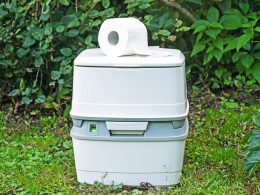Camping is an excellent way for families of all sizes to make memories. Those who grow up camping with their families will often pass the camping tradition to their children. While previous generations grew up tent camping, the increased demand for RVs indicates that future generations will likely remember camping in RVs.
No matter what type of camping you’re doing, you want your fellow campers to be safe, especially the little ones. Babies are notorious for getting into just about anything within reach.
So are RVs safe for babies? Let’s look and see!

Can You Travel in An RV With a Baby?
“Where there’s a will, there’s a way!” is a famous saying that can apply to traveling in an RV with a baby. Parents with babies and small children will find a way to make just about anything happen if it’s something they’re passionate about. RVing with a baby is no different!
While bathing, feeding, and sleeping in an RV can be more complex, it’s not impossible. It’s easier in some RVs than others, so it’s essential to consider this while shopping for RVs.
Some rigs, like Grand Design’s 311BHS, have bunkhouses with multiple beds and a designated half bathroom. This rig can sleep ten and has plenty of seating space for meals.
A towable RV can make it easier to travel with a baby as the tow vehicle will have a spot for a car seat and seat belts for each seat. Motorhomes may not have sufficient seating and may require parents to drive a separate vehicle.
Children who require a car seat in a passenger vehicle will need to utilize a car seat in a motorhome. Only install car seats to chairs connecting to the chassis and not the RV’s interior.
Are RVs Safe for Babies?
RVs can be a safe way to travel with babies if you take the proper precautions. However, a significant concern for many parents is the seating situation. This is especially true if you’re planning to travel in a motorhome.
You may need to drive in a different vehicle if your motorhome cannot safely transport an infant car seat. Installing an infant car seat into a chair not connected to the chassis could be very dangerous in an accident.
You also want to ensure you close all cabinets, drawers, and objects that could go flying while you travel down the highway. Sharp objects like knives and breakable things like plates and coffee mugs can turn into projectiles when making turns.
While there are some dangers for babies and others in an RV, plenty of safety mechanisms are in place to keep you safe. Smoke detectors, carbon monoxide detectors, and seat belts can keep you and your fellow travelers safe during your adventures. You must test them regularly to ensure they’re working correctly and keep you safe in an emergency.

Can You Baby-Proof An RV?
Just as you can baby-proof a home, you can baby-proof an RV. If you’re planning to spend much time in your RV with a little one, baby-proofing it will be a constant process as they’re growing. You should install outlet covers, knob covers, oven locks, and a baby gate. If you’re a parent, you know that babies are curious by nature and will investigate everything.
One investment worth making for parents of children of all ages is a wireless alarm. An alarm can alert you when a door opens, which can help deal with an ornery toddler or teenager. If a door opens when it shouldn’t, you’ll hear the alarm and be able to investigate the situation.
HOT TIP
Ditch the screens and enjoy nature with these family game ideas for your next camping trip.
Are Bigger RVs Safer for Babies?
Bigger RVs aren’t invincible and can still be dangerous. However, these rigs are often more capable of absorbing the impact of accidents and keeping the individuals safe inside the rig. Just because you’re traveling in a big rig doesn’t mean you can let your guard down for safety precautions.
Everyone should remain seated and wear their seatbelt correctly when the vehicle is in motion. Ensure all pre-trip inspections and complete any essential maintenance before heading out for an adventure. You can never take safety too seriously when traveling!
Is It Safe for Babies to Sleep in An RV?
Finding a safe place for a baby to sleep in an RV can be challenging. You may use a pack-n-play or bassinet at home, but the limited space in an RV can make it challenging to find one that fits. If you can find one that works, these options maximize your baby’s safety while you’re stationary.

A baby sleeping while in transit will need to remain in their car seat. It may not be as comfortable for them, but a baby sleeping on a bed or in your arms while in motion is likely illegal and dangerous if an accident occurs.
If you maintain a strict schedule for your child, you may want to plan your trips and travel times around that schedule.
How to Travel Safely in Your RV With Your Baby
While we think safety should always be a top priority while RVing, it’s crucial when you’re traveling with children. By taking a handful of safety precautions, you can help ensure everyone arrives safely at your campsite!
Be Aware of Safety Laws
You need to be aware of the safety laws and restrictions where you’re traveling. These rules and regulations vary by state. Just because your state restrictions allow a child to use a particular car seat or restraint system doesn’t mean every state does.
If you’re planning a road trip that involves crossing state borders, it’s worth looking at the various states’ requirements. You don’t want to find yourself in a legal issue should you get pulled over by law enforcement.
Don’t Drive Distracted
According to the National Highway Traffic Safety Administration (NHTSA), there are more than 3,000 deaths annually due to distracted driving. You should never get distracted while driving, especially driving or towing an RV. Large rigs require a generous amount of room to stop, and in some cases, you’ll need every inch to avoid an accident.
You should set your GPS and know your route before hitting the road. It would be best to decline phone calls or allow passengers to take them for you. Some states have zero-tolerance laws when it comes to distracted driving. It only takes looking away from the road for a split second to put yourself and your fellow campers in a problematic situation.
Use a Tow Vehicle Or Second Car
A tow vehicle or a second vehicle can allow everyone to stay as safe as possible. A tow vehicle with a towable RV ensures everyone with a seat has a designated safety restraint, whether they’re old enough to use a seatbelt or their car seat fastens to the vehicle.
A second vehicle can be helpful if your motorhome isn’t capable of safely seating your passengers. Remember, you can never take safety too seriously while RVing. A second vehicle may require more fuel and take up space at your campsite, but everyone’s safety is worth it.

Have the Appropriate Gear and Safety Features
Before hitting the road, inspect all gear and safety features to ensure they are working. Check the batteries in your smoke and carbon monoxide detectors, ensure all of your lights and signals are functioning on your vehicle or RV, and make sure you’re under your weight ratings regarding towing.
Overloading an RV can create a hazardous situation and reduce the amount of traction your steering axle has with the road. Know your vehicle’s towing capabilities and drive across a CAT Scale to ensure you’re within the safety ratings.
RV Travel With Your Baby Can Be a Unique Experience
If you take the proper safety measures, RVing with your baby can be a unique and exciting experience. You can expose them to the wilderness and help create an appreciation and respect for nature. This environment is a fantastic place for children to use their imaginations and can create many opportunities for families to bond.
While you may not find a stressful camping experience funny at the time, years down the road, you might find yourself sitting around a campfire laughing about it as a family. RVing provides an infinite amount of opportunities for families to make memories together.
What do you think is the hardest part of traveling with young children?
If You Want the Latest Travel News, Join Our Mailing List
Don’t rely on biased RV industry news sources to keep you informed. Stick with Nomadic News. We publish articles and breaking stories that matter to you every weekday.










